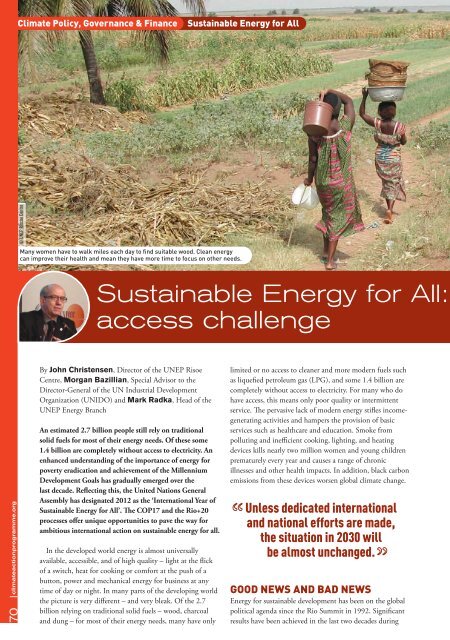Climate Action 2011-2012
You also want an ePaper? Increase the reach of your titles
YUMPU automatically turns print PDFs into web optimized ePapers that Google loves.
<strong>Climate</strong> Policy, Governance & Finance<br />
sustainable energy for all<br />
© UNEP Riscoe Centre<br />
Many women have to walk miles each day to find suitable wood. Clean energy<br />
can improve their health and mean they have more time to focus on other needs.<br />
Sustainable Energy for All:<br />
access challenge<br />
70 climateactionprogramme.org<br />
By John Christensen, Director of the UNEP Risoe<br />
Centre, Morgan Bazillian, Special Advisor to the<br />
Director-General of the UN Industrial Development<br />
Organization (UNIDO) and Mark Radka, Head of the<br />
UNEP Energy Branch<br />
An estimated 2.7 billion people still rely on traditional<br />
solid fuels for most of their energy needs. Of these some<br />
1.4 billion are completely without access to electricity. An<br />
enhanced understanding of the importance of energy for<br />
poverty eradication and achievement of the Millennium<br />
Development Goals has gradually emerged over the<br />
last decade. Reflecting this, the United Nations General<br />
Assembly has designated <strong>2012</strong> as the ‘International Year of<br />
Sustainable Energy for All’. The COP17 and the Rio+20<br />
processes offer unique opportunities to pave the way for<br />
ambitious international action on sustainable energy for all.<br />
In the developed world energy is almost universally<br />
available, accessible, and of high quality – light at the flick<br />
of a switch, heat for cooking or comfort at the push of a<br />
button, power and mechanical energy for business at any<br />
time of day or night. In many parts of the developing world<br />
the picture is very different – and very bleak. Of the 2.7<br />
billion relying on traditional solid fuels – wood, charcoal<br />
and dung – for most of their energy needs, many have only<br />
limited or no access to cleaner and more modern fuels such<br />
as liquefied petroleum gas (LPG), and some 1.4 billion are<br />
completely without access to electricity. For many who do<br />
have access, this means only poor quality or intermittent<br />
service. The pervasive lack of modern energy stifles incomegenerating<br />
activities and hampers the provision of basic<br />
services such as healthcare and education. Smoke from<br />
polluting and inefficient cooking, lighting, and heating<br />
devices kills nearly two million women and young children<br />
prematurely every year and causes a range of chronic<br />
illnesses and other health impacts. In addition, black carbon<br />
emissions from these devices worsen global climate change.<br />
Unless dedicated international<br />
and national efforts are made,<br />
the situation in 2030 will<br />
be almost unchanged.<br />
Good news and bad news<br />
Energy for sustainable development has been on the global<br />
political agenda since the Rio Summit in 1992. Significant<br />
results have been achieved in the last two decades during












